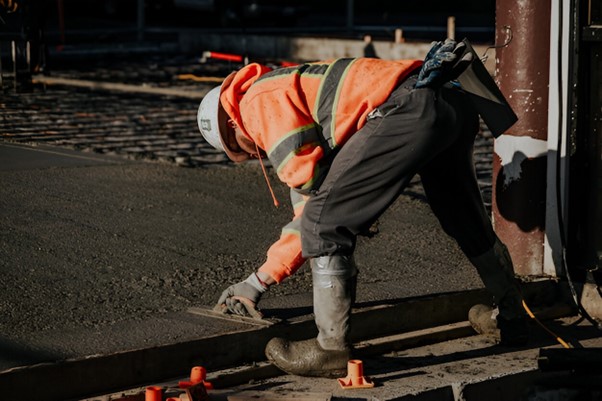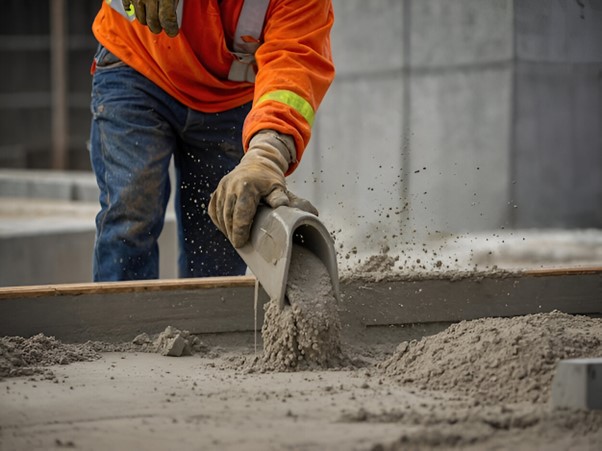
Are you standing at the threshold of a concrete project, feeling a mix of excitement and trepidation? Perhaps you’re envisioning a sleek new driveway that will elevate your home’s curb appeal, or maybe you’re dreaming of a spacious patio where countless summer barbecues will unfold. Whatever your concrete aspirations may be, one question looms large: How do you ensure you hire the right concreter to bring your vision to life?
The importance of this decision cannot be overstated. After all, concrete is not just a building material; it’s the foundation upon which your dreams are built. A skilled concreter can transform your ideas into reality, creating durable, beautiful structures that stand the test of time. On the flip side, an inexperienced or unreliable contractor can turn your project into a costly nightmare, leaving you with cracked surfaces, uneven finishes, or worse.
This comprehensive guide is designed to be your roadmap through the often-confusing terrain of hiring a concreter. We’ll explore the essential steps you need to take, from initial research to final inspection, ensuring that you make an informed decision every step of the way. By the time you reach the end of this post, you’ll be armed with the knowledge and confidence to choose a concreter who not only meets but exceeds your expectations, setting the stage for a successful project that you’ll enjoy for years to come.
Research and Shortlisting: Building Your Dream Team
The journey to finding the perfect concreter begins with thorough research. In today’s digital age, a wealth of information is at your fingertips, waiting to be explored. Start by utilizing online resources and directories specifically tailored to the construction industry. Websites like HiPages, Oneflare, or ServiceSeeking can provide a good starting point, offering lists of concreters in your area along with customer reviews and ratings.
However, don’t limit yourself to online searches alone. Some of the best recommendations can come from those closest to you. Reach out to friends, family, and neighbors who have recently undertaken concrete projects. Their firsthand experiences can offer invaluable insights into the quality of work, reliability, and professionalism of local concreters. Pay attention to both positive and negative feedback, as this will help you form a more balanced view of potential candidates.
As you gather information, start creating a shortlist of potential concreters. Aim for a list of at least five to seven contractors who seem to align with your project requirements. This shortlist will serve as your foundation for the next steps in the hiring process, allowing you to dive deeper into each candidate’s qualifications and suitability for your specific project needs.
Credentials and Experience: Separating the Experts from the Amateurs
Once you have your shortlist, it’s time to dig deeper into each concreter’s credentials and experience. This step is crucial in separating the true professionals from those who might lack the necessary skills or qualifications. Start by verifying that each concreter on your list holds the appropriate licenses and insurance. In Australia, requirements can vary by state, so check with your local licensing board to understand what’s required in your area.
Next, assess the years of experience each concreter has in the industry. While newer companies can certainly deliver quality work, there’s often no substitute for the knowledge and expertise gained through years of hands-on experience. Look for concreters who have been in business for at least five years, as this typically indicates a level of stability and customer satisfaction that has allowed them to thrive in a competitive market.
Consider the specializations and areas of expertise of each concreter. Some may excel in decorative concrete work, while others might specialize in large-scale commercial projects. Ensure that their expertise aligns with your specific project needs. Additionally, look for memberships in industry associations such as the Concrete Institute of Australia or relevant certifications. These affiliations often indicate a commitment to ongoing education and adherence to industry best practices.
Portfolio and References: Seeing is Believing
With credentials verified, it’s time to examine the tangible evidence of a concreter’s skills: their portfolio. A reputable concreter should be more than willing to show you examples of their past projects. Look for diversity in their work, paying close attention to projects similar to what you have in mind. High-quality photos can be informative, but nothing beats seeing the work in person if possible.
Don’t hesitate to ask for site visits to previous jobs. This gives you the opportunity to see the concreter’s work up close, assess the quality of finishes, and even speak with previous clients if they’re available. Pay attention to how well the concrete has held up over time, looking for any signs of premature cracking, discoloration, or other issues that might indicate poor workmanship.
Contacting references is another crucial step in your due diligence process. Prepare a list of questions to ask previous clients, focusing on aspects like timeliness, communication, problem-solving abilities, and overall satisfaction with the finished product. Be wary of any concreter who is hesitant to provide references or if you notice a pattern of negative feedback among past clients.

Detailed Quotes and Contracts: Laying the Foundation for Success
With your top candidates identified, it’s time to request detailed quotes for your project. A comprehensive quote should break down all aspects of the job, including materials, labor, equipment, and any additional costs such as permits or site preparation. Be wary of quotes that seem vague or unusually low compared to others, as these could indicate corners being cut or potential hidden costs down the line.
Understanding the scope of work and materials is crucial at this stage. Ensure that the quote clearly outlines the type and quality of concrete to be used, any reinforcement methods, and the specific finishes or treatments you’ve requested. A clear timeline with project milestones should also be included, giving you a realistic expectation of when your project will be completed.
Once you’ve selected your preferred concreter, the next step is to review and sign a contract. This document is your protection and should include all the details discussed in the quote, plus additional clauses covering warranties, payment schedules, and procedures for handling any changes or disputes that may arise during the project. Don’t be afraid to ask questions or request modifications to the contract if something doesn’t seem clear or fair.
Communication and Compatibility: Ensuring a Smooth Process
The success of your concrete project doesn’t just depend on technical skills; effective communication and a good working relationship with your concreter are equally important. During your interactions with potential concreters, pay attention to their communication style and responsiveness. Are they prompt in returning your calls or emails? Do they take the time to explain technical aspects in a way you can understand?
Clear expectations from both parties are essential for a smooth project. Discuss your vision in detail, including any specific design elements or finishes you desire. A good concreter should be able to offer suggestions or alternatives based on their expertise, helping you refine your ideas into a feasible plan. They should also be upfront about any potential challenges they foresee and how they plan to address them.
Building a rapport with your chosen concreter can make a significant difference in the overall experience. While you don’t need to become best friends, a level of trust and mutual respect will help navigate any unexpected issues that may arise during the project. Pay attention to how well they listen to your concerns and how they approach problem-solving. A concreter who is willing to collaborate and find solutions is invaluable, especially on complex projects.
Understanding the Concrete Process: Knowledge is Power
Empowering yourself with basic knowledge about the concreting process can significantly enhance your ability to communicate effectively with your chosen professional and make informed decisions about your project. Familiarize yourself with essential concrete terminology such as slump (which measures the concrete’s workability), PSI (pounds per square inch, indicating strength), and curing (the process of hardening and gaining strength).
Different types of concrete finishes can dramatically alter the look and functionality of your project. From smooth troweled surfaces to exposed aggregate or stamped patterns, understanding your options will help you articulate your vision more clearly. Discuss these options with your concreter, considering factors like aesthetics, slip resistance, and maintenance requirements.
A good concreter will explain the steps involved, such as soil compaction, formwork installation, and reinforcement placement. Understanding these processes will help you appreciate the work involved and recognize quality preparation when you see it.
Lastly, learn about the curing process and ongoing maintenance requirements. Proper curing is crucial for achieving maximum strength and durability, while regular maintenance can significantly extend the life of your concrete. Your concreter should provide detailed instructions on how to care for your new concrete surface to ensure its longevity.
Conclusion
As we wrap up this comprehensive guide to hiring the best concreter, it’s clear that the process involves much more than simply picking a name out of a directory. By following the steps outlined in this post – from thorough research and credential verification to understanding the concreting process and establishing clear communication – you’re setting yourself up for a successful project that will stand the test of time.
Remember, the key to a triumphant concrete project lies not just in the pouring of the concrete itself, but in the careful selection of a skilled professional who can bring your vision to life. The time and effort you invest in finding the right concreter will pay dividends in the form of a beautiful, durable, and functional concrete feature that enhances your property for years to come.
As you embark on your concrete journey, keep in mind that the best outcomes are often the result of a collaborative effort between an informed client and a skilled professional. Don’t be afraid to ask questions, voice your concerns, and actively participate in the decision-making process. Your engagement, combined with the expertise of a top-notch concreter, will ensure that your project not only meets but exceeds your expectations.
In the end, the perfect concreter for your project is out there. Armed with the knowledge from this guide, you’re now well-equipped to find them and work together to create something truly spectacular.
